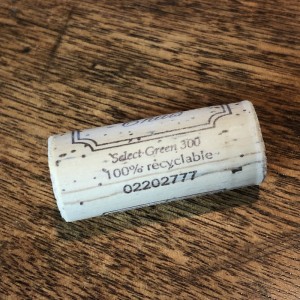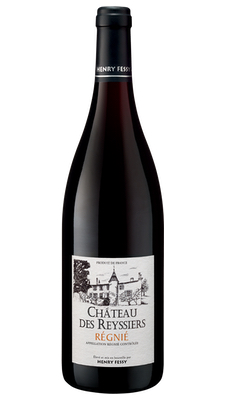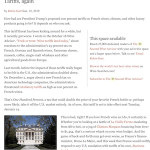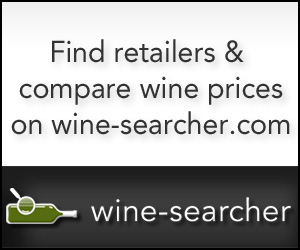When I pulled the cork from a bottle of Henry Fessy Château des Reyssiers Régnié to enjoy with lunch the other day, I was a bit irritated to discover that its cork was not a cork.
Be the Favorite
Treat the moms in your life to delicious deliveries of small-batch wines from the best artisan wineries with The California Wine Club. Save 15% on your gift purchase with promo code TREAT15. (This offer expires on June 30, 2020.)
Learn more below, or click now to see the offer.
Browse the world’s ten best value wines on Wine-Searcher.com!
Wait! What?
That’s what I said. This wine was stoppered with one of those pale, flesh-colored plastic plugs. Feh! I thought those had gone off the market years ago, rejected by wine nerds because wines deteriorated so rapidly under them.
Sure, those stoppers were popular for a while, back in the early 2000s, when much of the wine industry was moving rapidly away from often-tainted natural cork in the direction of plastic “corks,” sturdy metal screw caps, and a few more offbeat items such as glass apothecary stoppers.
It didn’t take long, though, for most wine enthusiasts to discover that screw caps were winning that battle. After mastering a glitch or two, the screw cap proved a secure, clean alternative with the added advantage of being easy to put back on a half-full bottle after the meal.
The cork industry fought a spirited retreat, at least in the high-end sector, improving sourcing and sanitation in cork production as well as developing “technical” corks like DIAM made from cork fragments chemically treated to remove the nasty chemicals that cause taint.
Amid all the competition, plastic stoppers quickly fell to the back of the pack. With the possible exception of the most inexpensive wines, made to buy and drink within months, these synthetic closures seemed to disappear from quality wines. I hadn’t encountered one for a while. Hence my groan when I realized there was on in my Régnié.
When I got it out, though, the lettering on the side of the stopper surprised me. Adjacent to the standard “Mis en bouteille dans nos chai” (“put in bottles in our cellar”), it read “Select Green 300 – 100% Recyclable.”
Well, that’s something new. What the heck is a “Select Green”? I promptly went down an Internet rabbit hole, seeking information from Google, and, of course, our WineLovers Discussion Group.
It turns out that “Select Green” is a product of Nomacorc, one of the firms that first marketed the synthetic stopper a couple of decades ago. It appears that there’s a new generation of synthetic stoppers. They’re still hard to get out of the bottle and off your corkscrew, but they come with at least two distinct advantages:
First, they’ve engineered materials that control the gradual, slow ingress of oxygen into the bottle – mimicking the behavior of natural cork – at several levels keyed to the length of time that the specific wine is intended for cellaring. This results in several grades of Select Green (100, 300, and 500 ranges) designed for different wines.
Second, they’ve gone “green.” The new closures, they say, are made from polymers based on sugarcane (and, in turn, limited to Brazilian growers who do not burn over their cane fields, an environmental assault). They seek to minimize environmental impact, claiming a reduced carbon footprint in making and distributing the corks. And they say the used closures are recyclable, in the triangle-4 category that is widely accepted by recycling centers.
Of course, screw caps are metal and may be tossed right in the recycling bin. Natural corks are a bit more challenging for recycling; they’re a natural product, but most recycling centers can’t use them, so they have to be taken to wine shops and other businesses that participate in programs like ReCork (currently suspended due to the pandemic).
But I like to recycle, so I’m happy to see this. And my 2017 Régnié village Beaujolais was in fine shape, a good wine, still fresh and young. You’ll find my tasting notes below.
Today’s Sponsor:
Be the Favorite
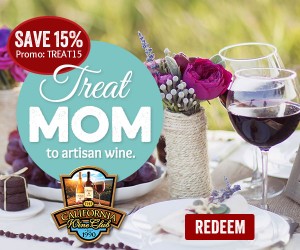 Treat the moms in your life to delicious deliveries of small-batch wines from the best artisan wineries with The California Wine Club. The club includes the story behind every bottle. Send as many gift months as you wish. We have five delicious clubs to choose from. All gifts include a $25 wine credit and a VIP Tasting Invitation.
Treat the moms in your life to delicious deliveries of small-batch wines from the best artisan wineries with The California Wine Club. The club includes the story behind every bottle. Send as many gift months as you wish. We have five delicious clubs to choose from. All gifts include a $25 wine credit and a VIP Tasting Invitation.
Save 15% on your gift purchase with promo code TREAT15.
See Offer.
This offer expires on June 30, 2020.
About The California Wine Club
There are thousands of small family wineries handcrafting extraordinary wine in quantities too limited to be found in local stores or shops. In 1990 The California Wine Club Founders Bruce and Pam Boring discovered that these winemaking families were the most passionate in the wine world and that their wines were the hidden gems of wine country! Together Bruce and Pam embarked on a journey to help these artisan wineries introduce their exquisite wines to the world. Learn more.
www.cawineclub.com 1-800-777-4443
Today’s Tasting Report
Henry Fessy 2017 Château des Reyssiers Régnié ($16.99)
This is a clear, dark, reddish-violet wine shading to a thin clear edge. Its aroma offers pleasant red berries, strawberries and raspberries with a whiff of black-cherry liqueur, and a hint of the high-toned volatile acidity that’s typical of Beaujolais. On the palate it’s fresh, juicy, and tart, balanced if somewhat rustic cherry-berry fruit framed by crisp acidity, light scratchy tannins, and subtle red-clay minerality joining red fruit in the finish. Very good Régnié, good with food, a moderate 13% alcohol claimed. U.S. importer: Louis Latour Inc., San Rafael, Calif. (April 30, 2020)
FOOD MATCH: Producer Henry Fessy suggests an eclectic list of pairings including white meats, grilled entrecote steaks, barbecued ribs and, broadly, “appetizers and cheese.” I found it an enjoyable match with a grilled fennel risotto.
WHEN TO DRINK: The Gamay-based wines from the named villages of Beaujolais, like Régnié, are generally capable of improving with time in a temperature-controlled cellar. If the synthetic stopper can be trusted, it should be good and could improve over the next three to five years.
VALUE:
My local price isn’t out of line with Wine-Searcher.com’s $16 average U.S. retail. It’s a good value at this price.
WEB LINK
Here’s a fact sheet on the importer’s website. For more detail, download this detailed PDF document from producer Henry Fessy.
FIND THIS WINE ONLINE:
Check prices and find vendors for Henry Fessy Château des Reyssiers Régnié on Wine-Searcher.com.
Read about Régnié at this Wine-Searcher link, and scroll down to find vendor and price listings for dozens of other wines from the village.
TALK ABOUT GAMAY:
Join this month’s Wine Focus conversation, GaMAY, in our WineLovers Discussion Group.
Today’s Sponsor:
Explore Wine-Searcher
Wine-Searcher.com is the place to go online if you want to find where to buy a particular wine that interests you. What’s more, Wine-Searcher.com offers so much more. It’s well worth a visit just to discover its many features, including its popular list of the world’s Top 10 Best Value Wines.
More affordable wines
Want tips to still more good, inexpensive wines? Here are Wine-Searcher links to vendors and prices for a bunch more wines for $10 or less that I’ve told you about during the past year or two. Please tell us about your favorites!
Sponsor the Wine Advisor.
We appreciate your support
Support The 30 Second Wine Advisor and help us pay the rent while reaching 25,000 dedicated readers with your sponsorship message in this space, at the top of this E-letter, and on our social media. If you’re an established business in wine, food, and similar ventures, there’s no better way to focus your message toward an audience that comes here for just those topics. See our Sponsorship Page, or email Robin Garr for more information.
Wine Forum and Social Media
If you have questions, comments or ideas to share about today’s article or wine in general, you’re always welcome to drop by our online WineLovers Discussion Group, the Internet’s first and most civil online community.
Discussions are open for public viewing, but you must register to post. If you’re a Facebook user, you can join our forum with a single click! All you need to do is visit the forum and click “Social Login” at upper right.
We’d also be delighted to have you visit and “Like” our WineLovers Facebook Page. This way you can get Facebook notifications when there’s a new The 30 Second Wine Advisor issue or a topic of particular interest on the WineLovers Discussion Group (WLDG).
Subscriptions and Administrivia
Unsubscribe:
We’re sorry if you must leave us, but simply click the “unsubscribe” link at the bottom of your Email edition to be instantly removed from the mailing list.
Change address:
The quickest and easiest way to change your email address is simply to unsubscribe from your old address and register again from the new one: Subscribe to The 30 Second Wine Advisor (free).
Archives:
Read nearly 20 years of past articles in the Wine Advisor Archives.
Sponsorship Opportunities:
For information, email Robin Garr at wine@wineloverspage.com

